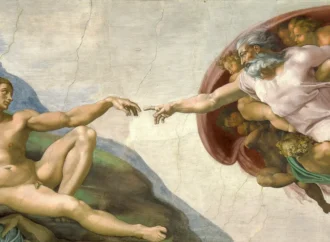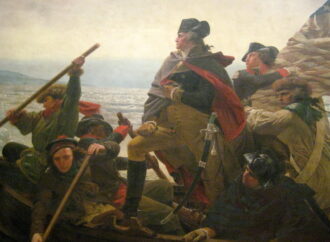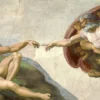The Darkening Age: the Christian Destruction of the Classical World
Catherine Nixey
London 2017
ISBN 978-1-5098-1232-5
The reviewer who happens to be a Christian believer might well approach this book with trepidation.
As if the title doesn’t say it all, the wrapper blurb describes the Christian faith as ‘violent, ruthless and intolerant’, and historian Michael Scott, quoted on the back cover, says of Nixey’s ‘elegant and ferocious text’ that it ‘paints a dark but riveting picture of life at the time of the “triumph” of Christianity’. One expects to have to face Dawkins with the gloves off.
In fact it’s better than that. In a total of 18 chapters (strictly 16 plus a prologue and introduction) Ms Nixey delivers a powerful and scholarly attack on almost every major aspect of Christianity during the first four or five centuries of its existence. She is clearly both learned and intelligent. The charges she levels against Christianity are generally well-based and deserve respect.
Like many writers against Christianity, the author takes pains to show that she understands her enemy from within and is capable of appreciating any good things it achieved (even if they be few). Her father, she tells us, was an ex-monk, her mother a former nun. Apparently they were both in good odour with the Church, for she explains that the family regularly went together to Mass each week, and that her parents were strong defenders of the value of Catholic culture and education.
In an interesting aside, though, she questions whether they ever actually believed in God; for her part she lost her faith (if she had ever had it) during her teenage years. It is an odd background and if her purpose in reporting it is to allay any suspicion that she is driven by uninformed anti-religious prejudice it is probably successful. Here is a picture of a woman who knows her stuff and writes without animus or partiality.
Or does she? If she personally hates the Christian religion she is clever and discreet enough to conceal it well and confine herself to reporting the hostile passions of others.
For example she devotes several pages to the attacks of Celsus, who loathed Christianity and Christians (‘children, cobblers, laundry-workers and yokels’), and tells us that ‘not one single unadulterated volume of the work by Christianity’s first great critic has survived’ (p. 32).
But just a page later she admits that ‘by a quirk of literary fate, most of his words have survived’. She rightly explains that Origen’s counter-attack nearly a century later quotes his opponent at length, and that perhaps 70% of Celsus has thus been preserved by scribes who wanted to include, or did not want to exclude, the very words of their sharpest critic!
This brings us to the weakest link in her attack on Christianity, and I think she deliberately fudges it. She strongly asserts the well-established principle that the victor writes the history, that Christianity viciously suppressed every voice of dissent[1] but I do not think that she sufficiently recognizes or acknowledges the truth that almost all the written material we possess from the ancient world has come to us through the agency of Christians copyists.[2]
It is incontestable that throughout the Christian centuries our scribes gave most of their attention to the Scriptures and to religious material. But there has always been that strain in Christianity that chose, in St Augustine’s words, to ‘spoil the Egyptians’[3] – to take the best from the pagan world, providing that it was ethically consistent with the Faith, and even to recognize that the Holy Spirit could make use of pagan thinkers to help prepare the world for the Incarnation.
Ms Nixey claims that only one per cent of ancient Latin literature has survived, and implies that this terrible loss of books is entirely due to Christian bigotry. I cannot imagine how she could possibly have arrived at such a figure. It could be true, of course, but it cannot be known.
We cannot come close to calculating how many words were written down by the ancients – the very thought of such an estimate is preposterous – but what we can be sure of is that we possess a good proportion of what the ancients considered to be their own best literature, the so-called classics. And our reasonable certainty about this arises from internal evidence: authors mention each other.
So we know which writers were highly regarded in their own society and we know the titles of particular works that were admired. We therefore have a pretty good idea of the gaps. Thousands of lines of the poet Ovid survive, for example, but his one drama, Medea, has long since disappeared.
St Augustine was greatly influenced by Cicero’s Hortensius, but it has completely vanished. Enormous quantities of Cicero’s speeches, letters, oratorical treatises and philosophical works survive, but the Hortensius sadly is not among them. One would love to have the Medea and the Hortensius, and one might even appreciate the discovery of some of the lost books of Livy, but in the meantime we should be grateful for the material we do have (regardless of the percentage!), confident that it includes most of the best things that were written, and that Christian scribes preserved it for us.
Ms Nixey believes that the number of Christians martyred was very much smaller than has been commonly thought. She accepts Gibbon’s claim that the average number of executions of Christian was about 150 per year, but only during the years of persecution, which she asserts were spasmodic and few. She adds that the estimate has been dropping in recent centuries as a consequence of better scholarship and the exposure of mythical martyr stories.
There may be some truth in this, but in refocusing thus she cannot avoid painting a picture of successive Roman administrations as relatively benign and well-disposed towards their wayward citizenry: kindly magistrates try to persuade stubborn Christians to make the formal sacrifice necessary to show their allegiance to the state.
While the extent of Christian sufferings is minimized, the author is unsparing in her pity for the remnant of the old Athenian Academy who suffered persecution at the hands of Christians. There is no doubt that once Christianity became the majority religion its supporters actively turned against the pagan diehards, but to say of one philosopher that ‘he was beaten before a judge until the blood flowed down his back’ (p. xxviii) is almost to weep crocodile tears.
The account is no doubt true, but against the savage backdrop of Roman law enforcement it is little more than routine. Most of her sympathy is reserved for pagans, though, and her concern for those who could no longer worship their own gods sounds less than sincere on the lips of an atheist.
I suspect that Nixey’s (and Gibbon’s) figures are as baseless as her claims about the loss of Latin literature. You simply cannot mount an argument from silence. We have absolutely no idea how many men and women were killed, or enslaved, or subjected to severe civil disabilities for the practice of their Faith, but we do know that modern scholarship has striven to minimize the number.
Perhaps the best way to test the plausibility of such figures is to look at the measurable and well-attested impact of Christianity on modern societies. For example, in Vietnam over a five-year period (1857-1862) it is estimated that 215 male and female religious and at least 5,000 lay people were killed and many more subjected to confiscation of property or exile.
On Gibbon’s figures the Romans were pussycats by comparison. Is that really likely? Her claims would be more convincing is she had attempted to assess the evidence of the numerous Christian martyrologies, including the work of the Bollandists, but there is no sign that she took them into account.
The truth is that Roman culture, for all its good qualities, was ruthless, violent, cruel and intolerant. It is very difficult for us to conjure up in our own minds, and Ms Nixey makes no real attempt to do so, the dread and loathing that pagan religion and its associated rites inspired in the hearts of those who found themselves to be outsiders.
Almost all that she says about Christian intolerance of Roman religious culture may be fair comment, yet she never for one moment considers the possibility that the claims of Christianity might be true. If they are, then the Incarnation was the most important event in the history of the world, and the trappings of paganism are utterly worthless and rightly discarded. If they are not, then Ms Nixey is correct to suppose, and to share the view of the old pagan party, that we Christians are the most foolish of men.
This review has not been particularly kind. I respect the author’s scholarship but sense that she has been forced by her own prejudices into painting a picture of the pagan world that is absurdly generous. The pagan world is noble for its elegance and its artistry. By contrast she cannot resist the temptation to compare the Christians to the modern Islamic State Caliphate, barbarians and vulgarians, vengeful and destructive.
Her argument is not advanced by her choice of illustrations which contribute nothing and fruitlessly add, no doubt, to the cost of production: we are shown a statue of a pagan goddess with her nose chopped off as an illustration of intolerant Christian vulgarity; there are busts of Constantine and Lucretius; a fanciful 19th century painting of martyrs in the arena; Hypatia, of course, gets a look in; and there are several icons of Christian saints looking fierce, intolerant and slightly mad.
Good theatre perhaps, but valueless in the context of debate.
Finally, it must be said that some of the writing that is decidedly over the top. Consider these extracts from the prologue in which the ‘destroyers’ (you can guess by now who they are) arrive at Palmyra:
“The zealots roared with laughter as they smashed the ‘evil’, ‘idolatrous’ statues; the faithful jeered as they tore down temples, stripped roofs and defaced tombs…
…were they, even fleetingly, impressed by the sophistication of an empire that could quarry, sculpt then transport marble over such vast distances? Did they, even for a moment, admire the skill that could make a kissably soft-looking mouth out of hard marble? Did they, even for a second, wonder at its beauty?
It seems not.”
I should like to finish this review on a kinder note. In her introduction Nixey says that “many, many good people are impelled by their Christian faith to do many, many good things. I know because I am an almost daily beneficiary of such goodness myself.”
This has the ring of sincerity about it. I respect her for that and acknowledge the difficulty of reviewing a book by one whose views are very different from one’s own and who is understandably outraged by religious zeal when it manifests itself in the persecution of its erstwhile persecutors.
Christians, like all men, can be mean-spirited. It is Grace alone that sets us apart.
–
David Daintree is Director of the Christopher Dawson Centre for Cultural Studies, in Hobart, Tasmania.
[1] She makes much of the fact, for example, that Lucretius’s atheistic poem de Rerum Natura survived in just one manuscript.
[2] Some exceptions are the autobiography (Res Gestae) of the Emperor Augustus preserved on tablets and fragments of papyrus letters from Egypt; the Dyscolos, Menander’s only play to survive almost in its entirety, has also come to us in an Egyptian papyrus, but certain Christian texts survive from what appears to be the same collection, so that there are reasonable grounds for supposing that the scribe was a member of a Christian community. Nixey’s concession that ‘Monasteries did preserve a lot of classical knowledge’ (p. xxxi) is a feeble and evidently reluctant concession.
[3] Augustine alludes to Exodus 12.36.
—
This MercatorNet article was republished with permission.
Dear Readers,
Big Tech is suppressing our reach, refusing to let us advertise and squelching our ability to serve up a steady diet of truth and ideas. Help us fight back by becoming a member for just $5 a month and then join the discussion on Parler @CharlemagneInstitute!
















Leave a Comment
Your email address will not be published. Required fields are marked with *